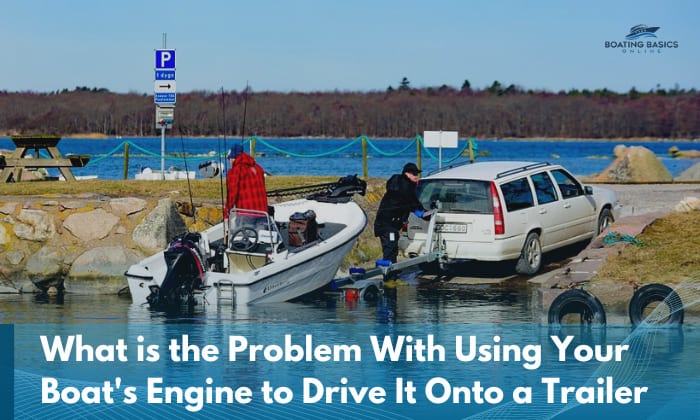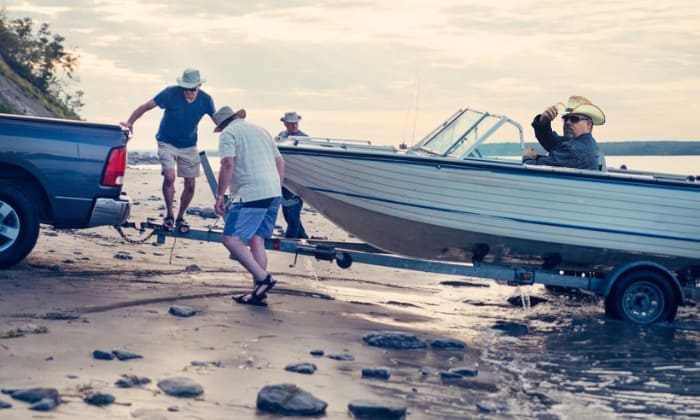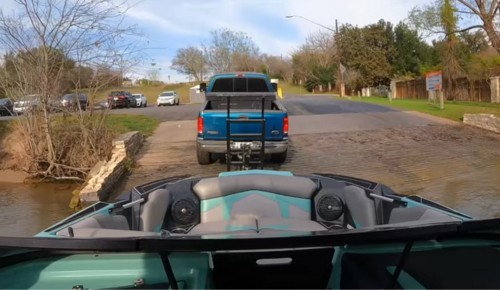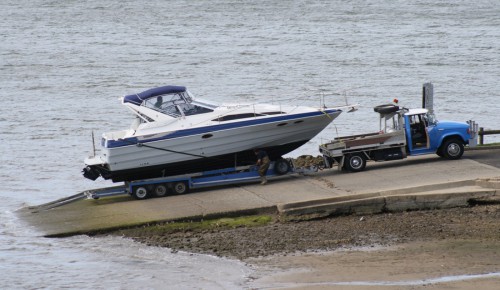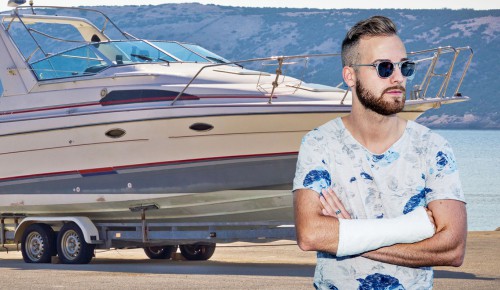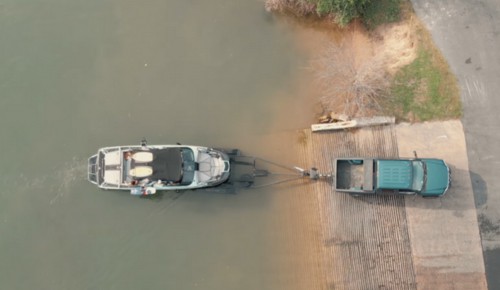Have you always thought the most efficient and convenient approach is to drive the boat onto a trailer? I can’t blame you since that’s what it looks like at first glance; however, the truth is that this act can result in many issues.
So, what is the problem with using your boat’s engine to drive it onto a trailer?
You might damage vital components of the boat, like portions of the hull, winch cable, and engine, as well as the boat launch. It may even lead to injuries. Moreover, the deed can create washouts in which trailers may get stuck.
Table of Contents
The Dangers of Power Loading
In boating circles, the act of loading boats on trailers is termed “power loading”. It’s a polarizing topic, to say the least, as some experienced boaters will defend the practice to the bitter end, while others readily consider it taboo.
I tend to count myself among the latter because I’ve seen first-hand the major hull damage it can wreak – some of which can be extensive enough to warrant a hefty repair cost.
One thing is clear: there are many waterways in the US that do not allow power loading. These are the vital reasons you should consider doing without power loading.
1. It can damage your watercraft, its trailer, or your tow vehicle
Power loading is especially risky when you’re driving the vessel onto the trailer if it’s not substantially afloat, as it can overstress the hull. Just imagine the sudden force of the impact when you throttle the boat and it hits the trailer hard.
You never know when the next hard bump will be the one that cracks your hull. The same force can break the winch cable and the engine itself, and detach the trailer lights along with it. Surprisingly, this usually happens with small vessels and not large boats.
Jet boat owners shouldn’t even consider it, especially if the launch area is rocky because the boat would just suck up what it shouldn’t and possibly damage the impeller and jet pump liner.
The risk of damage extends to the trailer and the tow vehicle. For one, I had one buddy who ran into his pickup’s tailgate, causing thousands of dollars to repair (it wasn’t covered by his insurance).
2. It can ruin ramps
This ruin is often brought about by gradual erosion caused by the powerful downward water flow that power loading tends to create. That means any ramp that isn’t made of concrete is in trouble of losing its stability and can even be damaged directly.
I’ve lost count of gravel and sand boat landings that faded over time because people kept power loading onto their trailers in them. Even when the landings are made from concrete, power-loading vessels with high RPM can wash away the ramps’ base.
Erosion is related to washouts that can form from the practice as well. The more people do it, the more the ramp can become so deep that the next trailer that backs into it may have difficulties getting out.
Overall, it’s this reason why I don’t buy it when people say, “Well, it works for me every time.” Because, in the end, they may not be damaging their boat, but they obviously show a clear disregard for others using the ramps and launch areas.
3. Mound formations
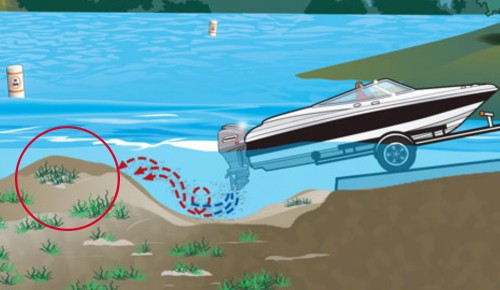
When you power load your boat onto the trailer, the sand and gravel washed away doesn’t just magically disappear. In fact, you can expect sand bars to form into a high mount behind the hole.
So, what problem does this phenomenon cause? For one thing, tall sand bars can increase the risks of boats running aground. For another, when the hull and motor collide with the shoals, there’s a high chance they’ll be damaged.
4. You may hurt someone
You never really boat by yourself. It’s not uncommon for boaters to have a friendly hand guiding the winch when loading the vessel onto the trailer at public ramps.
However, every time you put a boat on a trailer this way and only marginally pay attention, someone’s hand might get crushed because of the sudden lurching movement of the boat over the trailer. Most trailers can only create enough friction.
5. Something unexpected may happen
And when it comes to prized possessions like boats, you obviously want to steer clear of the unexpected. For instance, it may not be a commonly reported issue, but I’ve seen a handful of people have their steering go out. Others accidentally bump the throttle.
The results, let’s just say, were rather expensive. On the whole, the needless speed you apply when loading is the culprit in most untoward incidents related to power loading. This is why I always go nice and slow when loading my boat onto any trailer.
Conclusion
To sum up our answers to “What is the problem with using your boat’s engine to drive it onto a trailer?”, they can either spell trouble for your boat or the ramp you’re using. It’s not entirely impossible to face issues related to both.
This underlines the importance of knowing better alternatives like manual loading, hand loading, idling, or simply following local guidelines in the waters you frequent.
If it is allowed, make sure to follow what works for most boaters when loading their boats to trailers, such as doing proper boat alignment, winch usage, and positioning, to cite a few.

“My intention from the first day establishing Boating Basics Online is to provide as much help as possible for boaters who want to experience a first safe and convenient trip. So feel free to join us and share your beautiful journeys to the sea!”

